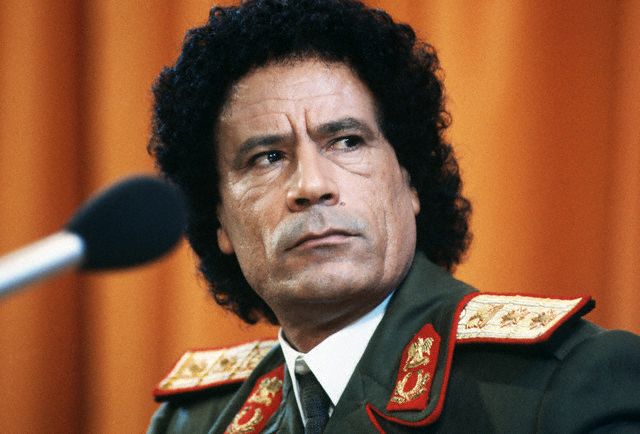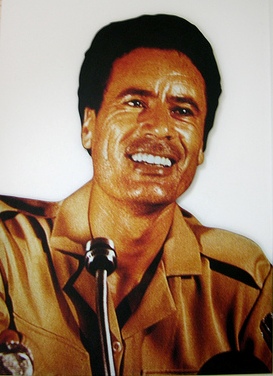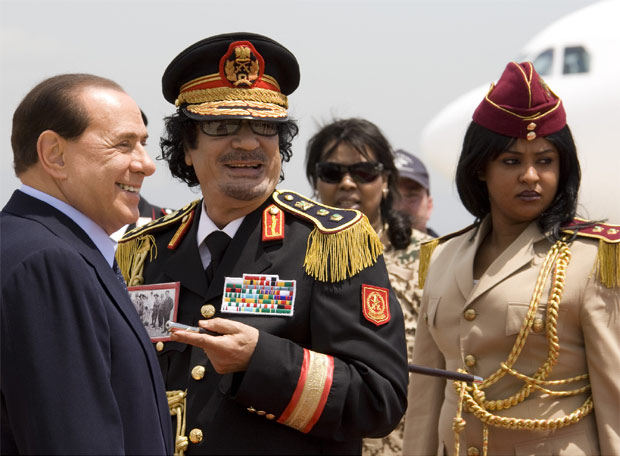Gaddafi Dies From Wounds
BREAKING NEWS!

Muammar Gaddafi is dead, Libya’s new leaders said, killed by fighters who overran his hometown and final bastion on Thursday. His bloodied body was stripped and displayed around the world from cellphone video.
Senior officials in the interim government, which ended his 42-year rule two months ago but had laboured to subdue thousands of diehard loyalists, said his death opened the way for a declaration of “liberation” after eight months of the war.
His body was expected in the long-standing rebel stronghold of Misrata, officials said as their Western sponsors held off from confirming that Gaddafi, a self-styled king of kings whom they had lately courted after decades of enmity, was dead at 69.
After Prime Minister Mahmoud Jibril confirmed his demise, the new national flag, resurrected by rebels who forced Gaddafi from his capital Tripoli in August, filled streets and squares as jubilant crowds whooped for joy and fired in the air.
In Sirte, a one-time fishing village and Gaddafi’s hometown that grandiose schemes had styled a new “capital of Africa,” fighters danced, brandishing a golden pistol they said they had taken from Gaddafi.
Accounts were hazy of his final hours, which also appeared to have cost the lives of senior aides. But top officials of the National Transitional Council, including Abdel Majid Mlegta, said he had died of wounds sustained in clashes.
FINAL HOURS
One possible description, pieced together from various sources, suggests that Gaddafi may have tried to break out of his final redoubt at dawn in a convoy of vehicles after weeks of dogged resistance. However, he was stopped by a NATO airstrike and captured, possibly three or four hours later, after gunbattles with NTC fighters who found him hiding in a drainage culvert.
NATO said its warplanes fired on a convoy near Sirte about 8:30 a.m. (2:30 a.m. EDT), striking two military vehicles in the group, but could not confirm that Gaddafi had been a passenger.
Accounts from his enemies suggested his capture, and death soon after from wounds may have taken place around noon.
One of Gaddafi’s sons, heir-apparent Saif al-Islam, was at large, they believed.
NTC official Mlegta told Reuters that Gaddafi had been wounded in both legs early in the morning as he tried to flee in the convoy which NATO warplanes attacked
“He was also hit in his head,” he said. “There was a lot of firing against his group and he died.”
There was no shortage of NTC fighters in Sirte claiming to have seen him die, though many accounts were conflicting. Libyan television carried a video of two drainage pipes, about a meter across, where it said fighters had cornered a man who long inspired both fear and admiration around the world.
After February’s uprising in the long discontented east of the country around Benghazi — inspired by the Arab Spring movements that overthrew the leaders of neighbouring Tunisia and Egypt — the revolt against Gaddafi ground slowly across the country before a dramatic turn saw Tripoli fall in August.
LIBERATION
An announcement of final liberation was expected as the chairman of the NTC prepared to address the nation of six million. They now face the challenge of turning oil wealth once monopolized by Gaddafi and his clan into a democracy that can heal an array of tribal, ethnic and regional divisions he exploited.
The two months since the fall of Tripoli have tested the nerves of the motley alliance of anti-Gaddafi forces and their Western and Arab backers, who had begun to question the ability of the NTC forces to root out diehard Gaddafi loyalists in Sirte and a couple of other towns.
Gaddafi, wanted by the International Criminal Court on charges of ordering the killing of civilians, was toppled by rebel forces on August 23, a week short of the 42nd anniversary of the military coup which brought him to power in 1969.
NTC fighters hoisted the red, black and green national flag above large utilities building in the centre of a newly-captured Sirte neighbourhood and celebratory gunfire broke out among their ecstatic and relieved comrades.
Hundreds of NTC troops had surrounded the Mediterranean coastal town for weeks in a chaotic struggle that killed and wounded scores of the besieging forces and an unknown number of defenders.
NTC fighters said there were a large number of corpses inside the last redoubts of the Gaddafi troops. It was not immediately possible to verify that information.
Story from Reuters. More on AlJazeera
03 August 2011
News reports from Paris-based AFP say the Arab League is in support of imposing a no-fly zone over Libya to prevent Muammar Gaddafi’s government forces from attacking rebels, according to sources quoting the league’s Secretary-General.
The Libyan leader has “begun to feel the effects” of the sanctions imposed by the UN Security Council and the European Union [EU], which include freezing the Gaddafi family assets and a travel ban. Sources report that “the speed that decisions were taken on a variety of different levels has, in itself, surprised Gaddafi and his followers.” The source stressed that these steps aim to “isolate the Gaddafi regime, deprive it of funds, and reduce its power.“
Reuters reports that fighting intensified over the weekend as pro-government forces launched a second attack on the western town of Zawiyah on Saturday after rebels drove them out in the morning. The pro-Gaddafi forces apparently regrouped and launched another offensive. Eyewitnesses report that “the tanks are shelling everything on their way. They have shelled houses. Now they are shelling a mosque where hundreds of people are hiding”. Other eyewitness reports say there were more than 20 tanks in the area.
London-based Arabic newspaper Asharq Al-Awsat has reported exclusively that sources in the city of Benghazi say the besieged Libyan leader has declared his readiness to abandon power and leave Libya, in return for assurances of safety for himself and his family. Read the rest of this story @ Gaddafi sends negotiators to Benghazi
Swiss government announces freezing of Gaddafi’s assets. Al Jazeera reports death toll reaches 2000 persons and counting. Gaddafi’s second address blames Al Quaeda for the uprising. More senior officers defect and former Libyan Crown Prince Muhammad al-Senussi speaks out in favour of protesters from exile in London. International Organization for Migration (IOM) slams Italy for expressing more concern over fear of an influx of African migrants into Europe if Gaddafi falls, rather than concern for human rights violations and killing of protesters. More on Al Jazeera.

The events of Tunisia and Egypt have been described as “huge and irreversible strides towards democracy and better governance… by the youth” by philanthropist Mo Ibrahim. According to Ibrahim, “The message is that the future of Africa is safe in the hands of ‘its young people’, how wonderful!” More @ Mo Ibrahim Foundation.
With eyes set on the goal of liberation from four decades of dictatorship, Libyan protesters continue undeterred by shooting, bombing, the absence of international news media and shutdowns of the Internet for a second week. Seemingly determined to dispel the beliefs that “It can’t happen here“, the blood of Libyans continues to water the streets of Tripoli where strongman Muammar Abu Minyar al-Gaddafi is bringing down the sledgehammer to quell the protest.
Media reports speak of the resignation of the Justice Minister in protest over the deadly response of the Gaddafi government to the demonstrations and the defection of military officers to join the protesters as planes drop bombs and armed forces shoot indiscriminately at protesters. Eye witness reports that the death toll has reached 2000, saying: “Warplanes and helicopters are indiscriminately bombing one area after another. Anyone who moves, even if they are in their car, they will hit you.“
In a 75-minute address, a visibly angry Gaddafi was defiant and accused the protesters of ‘armed rebellion’ saying “We have not used force yet, but if we need to use force we will use it,” he said.

Calling on supporters to take the streets in support of his administration and to hand over the protesters, whom he called ‘rats and mercenaries’, Gaddafi further stated: “Peaceful protests is one thing, but armed rebellion is another.” He continued: “Muammar Gaddafi is the leader of the revolution, I am not a President to step down … This is my country. Muammar is not a President to leave his post; Muammar is leader of the revolution until the end of time.”
In spite of the show of force, the regime is showing signs of wear with defections growing and the protests escalating in the capital as well as in the east of the country. Gaddafi is also blaming Qatar-based television station al-Jazeera of causing the rebellion and the West for encouraging it, going on to warn European countries of an influx of African migrants if his regime fails.
Amidst the defections, Gaddafi is further battling with concerns about how to maintain control of the country’s armed forces of 45,000, of which only an estimated 5000 comprising his elite forces including the 32nd Brigade headed by his son Khamis, remain loyal.
Gaddafi took the reins of power in the North African country in a bloodless coup that toppled King Idris in September 1969, abolishing the monarchy and proclaiming the new Libyan Arab Republic. In 1972, Kaddafi gave up his title as Prime Minister but then took on the title of “King of Kings” reiterated at the 2009 Arab League Summit, at which he also claimed to be “leader of the Arab leaders” and “Imam of the Muslims”.

 Gaddafi’s eccentricities as a leader have become notorious. With a penchant for skin lightening, given to public outbursts and controversy, he dresses in flamboyant clothing and has a personal elite guard of women known as the Amazonian Guard – 40 virgins hand-picked by the Colonel himself, trained in martial arts and firearms and tasked with his personal protection. Breaking the acceptable cultural rules for the public comportment of Muslim women, the Amazonian Guards wear western apparel and make-up.
Gaddafi’s eccentricities as a leader have become notorious. With a penchant for skin lightening, given to public outbursts and controversy, he dresses in flamboyant clothing and has a personal elite guard of women known as the Amazonian Guard – 40 virgins hand-picked by the Colonel himself, trained in martial arts and firearms and tasked with his personal protection. Breaking the acceptable cultural rules for the public comportment of Muslim women, the Amazonian Guards wear western apparel and make-up.
The Libyan revolt is the latest and bloodiest of a string of uprisings that is sweeping across North Africa. In the past couple of weeks, dictatorships in Egypt and Tunisia have been overthrown and more appear to be imminent.
More on North Africa @ Missing Black Populations, Mubarak Out
